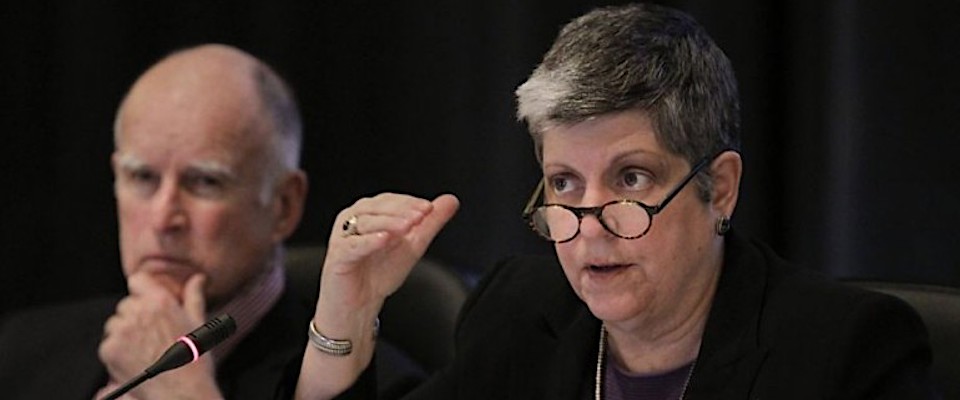The brouhaha over University of California President Janet Napolitano’s $175 million “slush fund” continues, with another UC Board of Regents meeting scheduled for Thursday and the Office of the President (UCOP) enduring ongoing opprobrium from legislators, the press, and state auditors. But some observers, including UC Berkeley Law School professor Stephen Sugarman, think the blame might be at least partially misplaced.
“The legislators who are complaining about this reserve fund are the same ones who have been starving UC, CSU, and the community colleges for a very long time.”
“The legislators who are complaining about this reserve fund are the same ones who have been starving UC, CSU, and the community colleges for a very long time,” he said. “I understand that there’s only a limited amount of money to go around. And maybe K-12 education, Medicaid, and low-income housing are more important than higher education. But our universities have been hurt a great deal over the past few decades by a lack of state appropriations. That’s the real issue.”
Napolitano disputed the figures cited by the auditor’s office, maintaining that the true reserve amount was only $38 million after discounting restricted funds and expenditures for programs congruent with either UC’s broad mission or state priorities, such as support for undocumented students and efforts to combat cyberattacks.
Certainly, lawmakers don’t see it that way. Napolitano was grilled mercilessly by legislators during a joint oversight hearing in Sacramento earlier this month, and her critics remain largely unmollified. Assemblyman Jose Medina (D-Riverside) told CALIFORNIA that he met with Napolitano shortly after the joint oversight hearing,“…and I told her that all options remain open. Citizens have a right to expect transparency in government. Last Thursday, the governor set aside $50 million [from the UCOP budget] to keep her feet to the fire, to make sure all the recommendations from the state auditor are fully implemented. I support that.”
The $386 increase had no real bearing on the true financial burden beleaguering Cal students, said Sugarman.
Napolitano acknowledged she could have handled the situation better, and said that UCOP will implement all oversight recommendations made by the auditor’s office. However, she remained firm in her disagreement with auditors over the scope of the fund. And Sugarman, for one, is inclined to support her number parsing, maintaining UCOP’s discretionary programs “…are deeply important to the people of California, the nation and world.” He cited a UCOP-supported global food initiative as an example.
“Could that money just have gone to the individual campuses, and spent at the discretion of the chancellors? Of course,” said Sugarman. “But is that necessarily a higher and better use? Food availability is a huge worldwide problem, and agriculture is a major part of California’s economy. I think promoting cooperation and encouraging joint action among the campuses is a good thing.”
Sugarman noted the angst over UCOP’s reserve fund was heightened by the recent decision to raise in-state tuition from $12,294 a year to $12,630. That move may have been impolitic, but the $386 increase had no real bearing on the true financial burden beleaguering Cal students, said Sugarman, maintaining food and housing costs were more of an onus than tuition.
“For another thing, Cal is the best public university in the nation,” he said, “and it’s also one of the country’s top two or three universities, public or private. Other UC campuses, such as UCLA and UC San Diego, are also literally world class. So considering what it costs to go to Stanford or Harvard, our tuition remains a bargain. Further, if a student’s family makes $100 thousand or less a year, tuition is completely waived.”
“One of my biggest concerns is a general refusal to recognize that our university operates in a marketplace.”
Sugarman also took issue with the state auditor’s contention that top UC staffers are paid lavishly, with ten UCOP executives earning a total of $3.7 million in the 2014-15 fiscal year. That’s $700,000 more than the combined salaries of the highest paid California state employees in comparable positions.
“One of my biggest concerns is a general refusal to recognize that our university operates in a marketplace,” Sugarman said. “I think most Californians want to maintain the standards of a university that is one of the top three in the country and one of the top four or five in the world. And if that’s the case, we have to compete for the best faculty and administrators.”
High salaries aren’t unique to Berkeley, continued Sugarman; they’re pretty much pro forma for any top university—or any university that supports a signature program, for that matter.
“The University of Alabama pays their football coach [more than $11 million a year],” he said. “Is it worth it? Apparently it is to Alabama: they make a lot of money on football, and being number one in college football is important to people in a state with significant poverty and other problems. Alabamans are proud of the University of Alabama. And we’re proud of Berkeley, but for reasons of research and academics. But if we don’t stay competitive, the best and the brightest grad students and undergrads will go to Harvard or Stanford or MIT.”
“The optics are not the greatest here, and the president is now vulnerable.”
Returning to his main thesis, Sugarman noted UCOP ultimately isn’t responsible for ensuring the university is adequately funded: That’s the job of the state legislature. He does believe, however, that Napolitano didn’t handle the survey issue well and that she was not forthcoming in providing information to the state auditor on specific discretionary spending programs. And this legitimate criticism, he said, has hobbled UCOP.
“The optics are not the greatest here, and the president is now vulnerable,” he said. “It’s odd. [Governor] Pat Brown was a great friend to the university, but since then, Republicans have been friendlier than Democrats. When Napolitano was appointed president, there were hopes that she and Jerry Brown would work together effectively. They were both governors, they were both legally trained, and it was thought they’d see eye-to-eye.”
But things haven’t worked out that way, Sugarman said.
“She hasn’t been particularly successful in fundraising, and she hasn’t been effective at securing a better deal for the university with state legislators. That has disappointed some people.”
“It could very easily devolve into a situation where legislators are pushing the university to fund research programs that promote a specific political objective”
Neverthless, Sugarman is adamant in his opposition to a proposal floated at the joint oversight hearing: direct funding of UCOP by the state legislature. In other words, lawmakers would oversee UCOP’s budget rather than leaving it to the discretion of the president and the regents. Such an arrangement could lead to policy interference by state legislators, damaging UC’s reputation, Sugarman said.
“It could very easily devolve into a situation where legislators are pushing the university to fund research programs that promote a specific political objective, or particularly powerful legislators could apply pressure to get extra funding for campuses in their districts,” he said. “It could also interfere with the effective day-to-day management of the university.”
“I said that all options were on the table, including direct [legislative] funding of UCOP.”
Certainly, Napolitano’s problems are not over. In fact, they’ve expanded to include the regents, who were unflatteringly portrayed during the joint oversight hearing as rubber stamps for the president’s priorities.
The regents will hear directly from State Auditor Elaine Howle on Thursday, said Medina, “…and I’m looking forward to seeing what steps the regents are taking to implement the auditor’s [oversight] recommendations. During the oversight hearing, I said that all options were on the table, including direct [legislative] funding of UCOP. I still won’t rule that out. There has been real concern about excessive coziness between the regents and the president. There are…vacancies on the board of regents, and as we move forward to fill them, I’d like to see people with a more hands-on approach, people who will demand more accountability.”



















